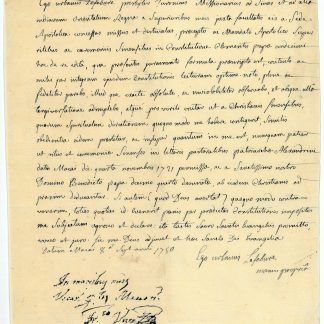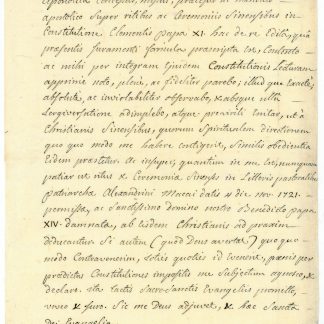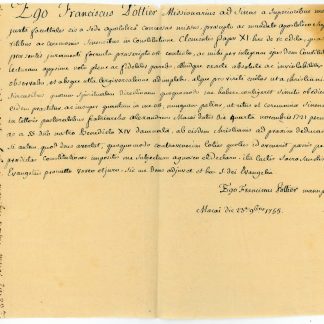Autograph document signed. Co-signed by Pierre Lacerre, designated Vicar Apostolic of Sichuan.
Oblong 8vo. 1 p. In Latin.
€ 3.500,00
An oath renouncing the practice of the Chinese rites, taken by the prominent member of the Paris Foreign Missions Society (M.E.P.) and later bishop as required by the Papal Bull "Ex Quo Singulari" (1742). The oath was sworn on the Bible, and a signed autograph ("manu propria") of the formula had to be produced as evidence. Most of these documents are co-signed by church officials or superior friars as witnesses to an oath sworn in their presence ("in manibus meis"), in this case the designated Vicar Apostolic of Sichuan Pierre Lacerre, M.E.P., who ultimately declined his elevation to bishop.
Born in La Chapelle-Saint-Hippolyte, Indre-et-Loire, Pottier studied at the Saint-Esprit Seminary and entered the Paris Foreign Missions Seminary in May 1753. Pottier left France in late 1753, reaching Macau in 1754, where he studied Chinese before leaving for mainland China. Already in 1756 Pottier was made provicar for Sichuan by Bishop Claude-François de Reymond. Together with only two Chinese priests, Pottier was responsible for five to six thousand Christians in the provinces of Sichuan and Guizhou. During an expedition to the remote and largely inaccessible Guizhou province in 1760, Pottier was arrested and brought to Chongqing, where he was subjected to torture and spent several months in prison. Pottier was supposed to be sent to Canton but managed to escape on the way, returning to his mission in Sichuan. In 1767 he was appointed Vicar Apostolic of Sichuan but could only be ordained in 1769 in Xi'an, Shaanxi, as he had to flee Sichuan again. Pottier died on 28 September 1792 in a Christian house near Chongqing. His coadjutor Jean-Didier de Saint Martin would succeed him as Vicar Apostolic for Sichuan.
During the early years of their mission to East Asia, the Jesuits led by Matteo Ricci accommodated Catholicism to Chinese customs and Confucian practice in important ways, both for political reasons and in the hope of attracting more converts. Criticism of this syncretism is as old as the Chinese rites themselves, and Ricci's direct successor Niccolò Longobardo attempted to change course, which led to his replacement as provincial. When Dominican and Franciscan missionaries entered China, they reported critically to Rome on the Jesuit practices. A first condemnation was decreed by Pope Clement XI in 1704 and confirmed in the 1715 Bull "Ex Illa Die". In reaction to the condemnation, the Kiangxi Emperor, who initially tolerated the Christian missionaries and had especially good relations with the Jesuits, officially forbade Christian missions in China. In 1721, Carlo Ambrosio Mezzabarba, the Latin Patriarch of Alexandria, was sent as a Papal legate to Macau and Beijing. Despite the concession of "eight permissions" regarding the practice of the Chinese rites, officiated in a pastoral letter to the missionaries from 4 November 1721, the Emperor did not revoke the ban. Finally, in "Ex Quo Singulari", Pope Benedict XIV re-affirmed the Bull of 1715 and required all missionaries in the region to take the oath renouncing the practice of Chinese rites.
A transcription and translation of the document are available on request.
With minor tears and some browning. Slightly trimmed.






